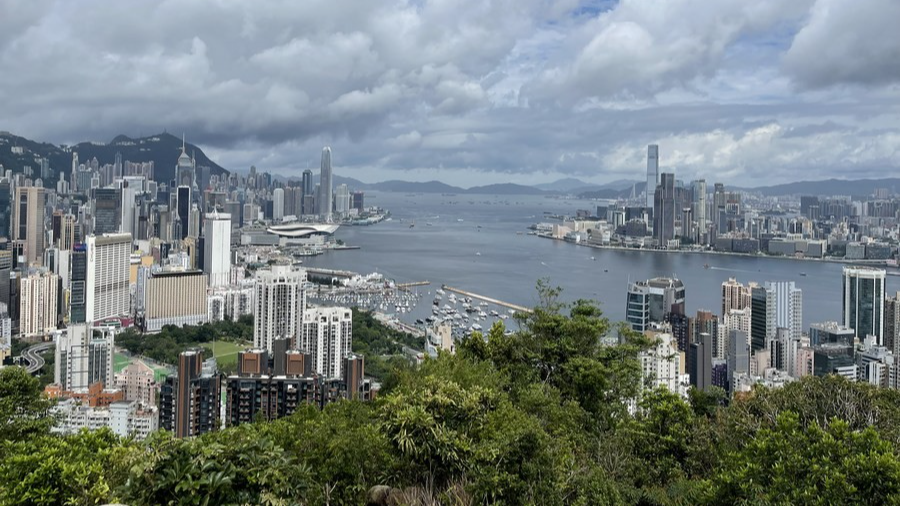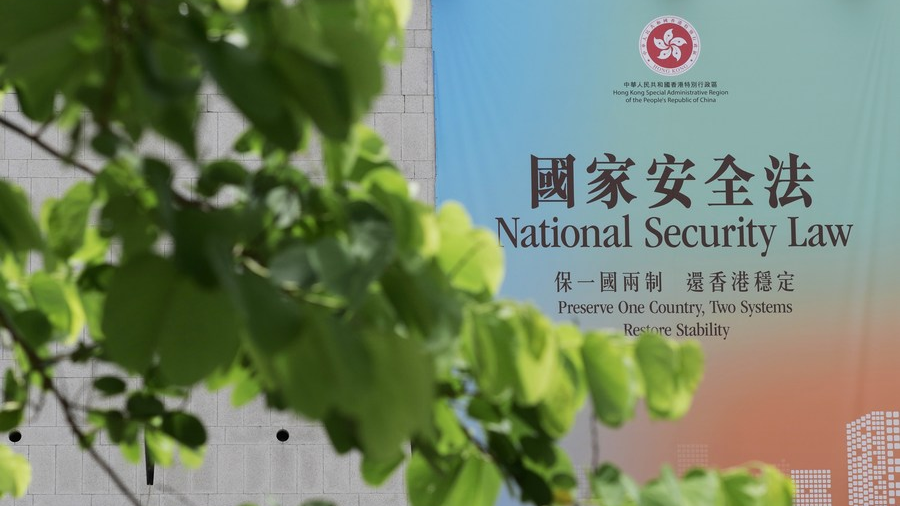
The view at the Victoria Harbor in Hong Kong, south China. [Photo/Xinhua]
By Grenville Cross
On May 30, a three-judge panel of the Court of First Instance convicted 14 defendants of conspiring to subvert state power. A further 31 defendants had already pleaded guilty, and the 45 offenders will return to court on June 25, for the start of the sentencing process.
The offenders, through a bogus "primary" poll, plotted to take control of the Legislative Council of the Hong Kong Special Administrative Region (HKSAR) and create mayhem. Once they were elected, all funding requests would be blocked, including the budget, and the government would grind to a halt. The chief executive of the HKSAR would have to resign, and they hoped the resulting constitutional crisis would provoke a confrontation with China's central government.
What the plotters envisaged spelt disaster for Hong Kong, but they nonetheless persevered, encouraged by anti-China elements elsewhere.
Although the attempt to wreck the "One Country, Two Systems" governing policy failed during the Hong Kong unrest of 2019, the plotters hoped to try again, using alternative means. They were not engaged in legitimate political activity, but in a squalid attempt to sabotage Hong Kong's governance from within. If the national security law for Hong Kong had not been enacted shortly before their plot was finalized, they may well have succeeded, but their gamble was foiled.

A billboard on the Law of the People's Republic of China on Safeguarding National Security in the Hong Kong Special Administrative Region, China, June 29, 2020. [Photo/Xinhua]
Even though the Basic Law of the HKSAR requires legislators to provide good governance and to be true to the Hong Kong SAR, their plot disregarded these obligations. If they had succeeded in destroying "One Country, Two Systems," the only beneficiaries would have been China's geopolitical rivals, who knew it would frustrate national progress. With the convictions of the plotters, their foreign supporters have rallied to their support, but not for the first time.
In 2023, after the plotters were charged, the Congressional-Executive Commission on China (CECC) of the U.S. tried to derail the proceedings, calling them "champions of democracy." It urged the authorities to drop the charges, a crude interference in a pending trial that the U.S. itself would never have tolerated. This was utterly misconceived, and the legitimacy of the charges became clear after 31 of the suspects pleaded guilty.
Once, however, 14 of the remaining 16 plotters were convicted, the CECC, co-chaired by Representative Christopher Smith and Senator Jeff Merkley, again weighed in. It claimed the verdicts bulldozed Hong Kong's "freedoms and rule of law" and violated "international law and treaty obligations." It called for the sanctioning of "judges and prosecutors responsible for these political prosecutions," which was a new low, even for Smith and Merkley. Although their grandstanding will have titillated the anti-China lobbies to which they pander, they have demeaned themselves in the process.
The 14 offenders received a fair trial, were legally represented, were able to give and call evidence, enjoyed the presumption of innocence, and were only convicted after their guilt had been established beyond reasonable doubt (two other suspects were acquitted, as the judges were unsure of guilt).
Although the CECC professed concern for the rule of law, their call for President Joe Biden to sanction the city's judges and prosecutors for holding the plotters to account highlighted their duplicity. By seeking to harm Hong Kong's legal system, they have shown contempt for the "rules-based international order," which the U.S. claims to support.
In 1985, the United Nations adopted its "Basic Principles on the Independence of the Judiciary." They provide that the independence of the judiciary should be constitutionally guaranteed (as it is in Hong Kong, by the Basic Law's Art. 85), and that it is "the duty of all governmental and other institutions to respect and observe the independence of the judiciary."
At the 8th UN Congress on the Prevention of Crime and the Treatment of Offenders in 1990, the Guidelines on the Role of Prosecutors was adopted, and this stipulates that "States shall ensure that prosecutors are able to perform their professional functions without intimidation, hindrance, harassment, improper interference or unjustified exposure to civil, penal or other liability." Prosecutorial independence is also guaranteed in Hong Kong, by the Basic Law's Art.63.
If the CECC's conduct is contemptible, nobody should be surprised, given its form.
In 2023, for example, Smith and Merkley nominated six individuals from Hong Kong for the Nobel Peace Prize. They included Jimmy Lai Chee-ying, the convicted fraudster, and Joshua Wong Chi-fung, who was convicted of an unlawful assembly that left 10 people injured. The awards committee realized they were being conned and gave the pair short shrift, and Biden will hopefully do the same.
The CECC has long since forfeited any credibility. It is a worthy successor of the late Senator Joseph McCarthy, whose "red" paranoia indelibly stained America's political legacy. Its objective is to perpetuate U.S. hegemony, and it tries to harm China at every opportunity. It should be shunned not only by anybody who believes in the "One Country, Two Systems" policy, but also by everyone who believes in decency in public life, in integrity in global affairs, and in the sanctity of the rule of law.
Grenville Cross, a special commentator on current affairs for CGTN, is a senior counsel and law professor, and was previously the director of public prosecutions of the Hong Kong SAR.

 中文
中文



